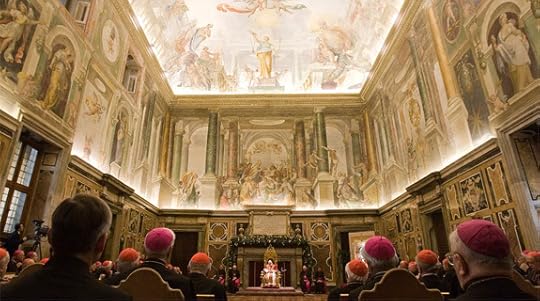On Being Human In a Civilization of Forgetfulness

On
Being Human In a Civilization of Forgetfulness | Fr. James V. Schall, S.J. | Catholic World Report
The
Pope understands that the wars of the world are still fought in the minds and
hearts of men.
“The
Church represents the memory of what it means to be human in the face of a
civilization of forgetfulness, which knows only itself and its own criteria.
Yet just as an individual without memory has lost his identity, so too a human
race without memory would lose its identity.”
— Pope
Benedict XVI,
Christmas Greetings to the Roman Curia, December 21, 2012.
“I would
say that the Christian can afford to be supremely confident, yes, fundamentally
certain that he can venture freely into the open sea of the truth, without
having to fear for his Christian identity. To be sure, we do not possess the
truth, the truth possesses us; Christ, who is the truth, has taken us by the
hand, and we know that his hand is holding us securely on the path of our quest
for knowledge.”
— Pope
Benedict XVI,
Christmas Greetings to the Roman Curia, December 21, 2012.
I.
Each year
the Holy Father gives a significant lecture to the Roman Curia about the events
of the previous year. In this year’s account, Benedict spent time recalling his
trips to Mexico, Cuba, and Lebanon. In the course of a year, the modern popes
probably see more important (and “unimportant”) people in the world than any
other public figure. Their trips to various countries are usually major events
in those countries. It is said that John Paul II was seen in person by more
human beings than any man in history.
In introducing
Pope Benedict, Cardinal Sodano recalled the liturgical antiphon: “Propre est
jam Dominus, venite adoremus–The Lord is near, come let us adore Him.” The
Child in the stable in Bethlehem, Benedict continues, “is God himself and has
come so close as to become a man like us.” Benedict never hesitates to identify
Christ as true God and true man. These very words—the “Child is God
Himself”—defy and challenge the whole world by affirming its truth.
Benedict
made a most interesting remark about Cuba: “That country’s search for a proper
balancing of the relationship between obligations and freedom cannot succeed
without reference to the basic criteria that mankind has discovered through
encounter with the God of Jesus Christ.” One presumes that, if that statement
is true for Cuba, it will be true for other lands, including our own.
Evidently, mankind has learned something about obligation and freedom from its
dealing with the reality of Christ. Essentially it is that no freedom exists
without corresponding obligation. Likewise, an obligation that is not freely
accepted is more like determinism or coercion than free responsibility.
II.
To the
Curia, Benedict devotes considerable discussion to two topics: the family and
the meaning of dialogue. The meeting on families in Milan gave the Holy Father
an opportunity to reflect on the nature of the family and the modern effort to
eliminate it as the central institution of human life.
Carl E. Olson's Blog
- Carl E. Olson's profile
- 20 followers



